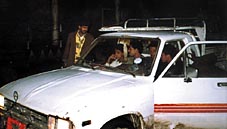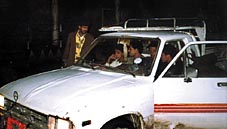
THE GOVERNMENT’S DECISION OF DISARMAMENT IN THE CITIES Wise, But Dangerous! [Archives:1999/36/Reportage]
September 6 1999

The Ministry of Interior sent the policemen and security to the main streets to inspect cars and take weapons. There are some people who respond positively to this campaign by surrendering their weapons, while others refuse to give them. Last week, we witnessed the final days of the campaign, which has ended without any tangible results. The Ministry did many campaigns before, and they all ended uselessly. We are here to affirm that the failure of disarmament in our country is due to the fact that most tribes think that this process is against their traditions, and because the sources of these weapons are still open. Hence, a confiscated weapon is still available for smugglers, and importers. Yemen Times surveyed this issue and tried to get the views of both the inspectors and inspected to see the possible solution which could turn Yemen into a more peaceful country.
In one of the inspection points, we asked one of the soldiers, Bandar Mohammed Doqaish on his view regarding this latest law and if what they are doing is worthwhile after all. He replied, ” We are now carrying out the instructions of the Ministry of Interior, by inspecting people and their cars in the morning and evening. We confiscate weapons and give a receipt. Indeed, we face a lot problems during this campaign. Many people reject to give their weapons. Some will even prefer to die instead of giving their rifles. This is because some men, especially from tribal backgrounds know their weapons as their honor, and can not go around without it. Indeed, it is very difficult to find a solution for this issue.”

Ali Hassan Mohammed, who is another soldier working on implementing this latest instruction, says, ” most people think that we do not carry out our responsibility in confiscating weapons. Now I want to tell them that we face all sorts of dangers during this campaign. For example, yesterday one of our colleagues was stabbed with a ‘Jambia’ by one of the tribesmen, while he wanted to inspect the car. The soldiers could not capture them because there were no police cars in the crossroads. They only took the number of the car, and I don’t think that the driver will ever be punished. If people help us do our job right, we will actually find a solution for this problem.”Fawaz Al- Ansi, a police officer says, “We try to find and eliminate weapons captured at the crossroads, etc. However, our job is not easy. We face lots of problems, especially with the tribesmen who refuse to give rifles thinking that these weapons are their honor, and no might on earth can take them away. Sometimes they did no not even stop their cars for inspecting, which makes us shoot at their cars with our guns. What can we do? We have instructions to do so when required. Regarding the decision of disarmament, it is a wise decision but still, we need more time to make people understand the noble mission we are doing. We also wish that this campaign will include the rural areas which are full of weapons.”
5-Mohammed Al- Sharabi, a soldier said the following: “The only solution which will definitely help in solving this problem is to launch various campaigns against, not only who carry these weapons, but most importantly, against the ones who sell them, whether in the cities or in rural areas. The decision of the Ministry of Interior is not good enough. One should stop the problem from its roots and close down the sources of those weapons. On the other hand, up to now, we still face many problems with people who refuse to give their guns.”
6- Abdulilah Al- Jarmozi is a government employee who was passing by the check point to be inspected, he said, ” The decision by itself is not sufficient. The right solution is to prevent the selling of guns in all places of the country. The country must put a limit on the weapon sellers who are the ones behind this mess. I would also stress on the fact that this decision is not being implemented on all.
It is implemented on the weak only. I will give an example here. I saw a car heading towards the airport full of soldiers who were all armed. Then, I looked at the inspecting soldiers to see what they will do. Guess what? They did not even dare of asking to inspect the car, simply because its owner is a high ranking official who sees himself above the law, and hence, cannot be inspected. That is the reason that makes people feel that there is inequality, and these inspection missions are usually useless, time consuming, and most of the time causing harassment to the normal citizens. It will eventually fail just like the previous ones. Here we affirm that the disarmament is a good way, but it needs the work of all of us and needs to be implemented on all.
——
[archive-e:36-v:1999-y:1999-d:1999-09-06-p:./1999/iss36/report.htm]


